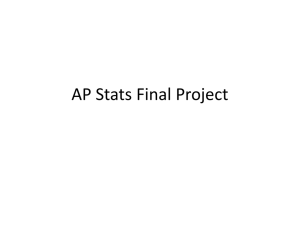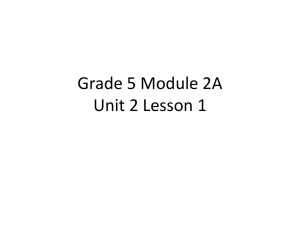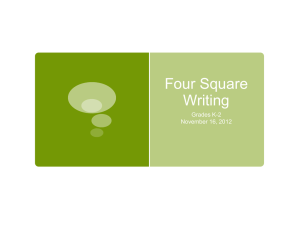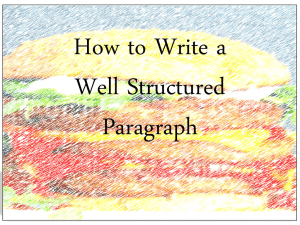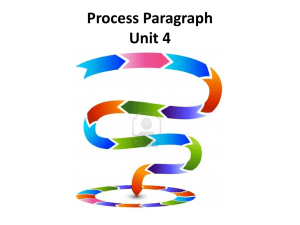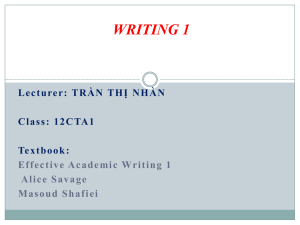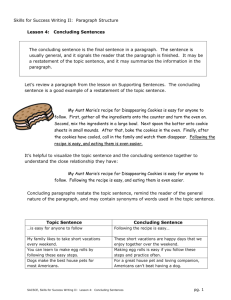Topic sentence
advertisement
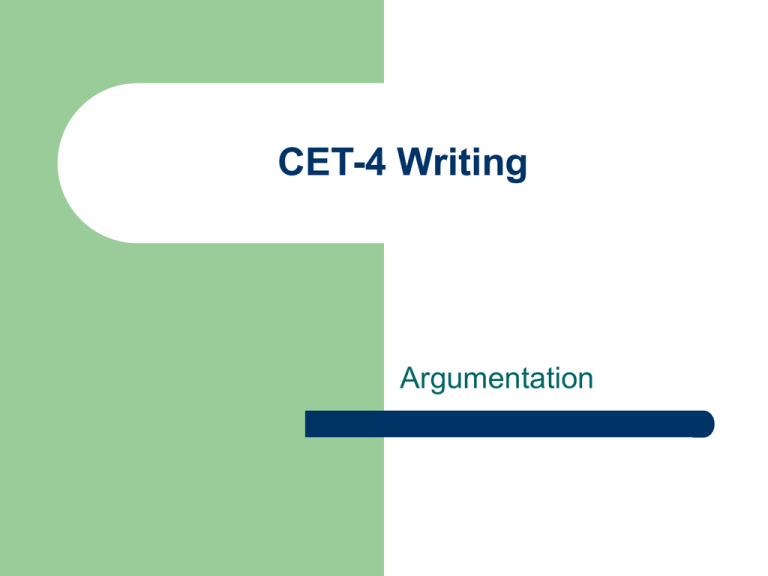
CET-4 Writing Argumentation Teaching objectives: To master the structure of an argumentative essay To learn how to develop a paragraph To learn something about topic sentence, supporting sentence and concluding sentence The purpose of argumentation : An argumentative essay tries to make the reader agree with its point of view and support it, to persuade him to change his mind or behavior, and to approve a policy or a course of action that it proposes. The requirements : A debatable point Sufficient evidence Good logic Clear logic Good use of description, narration and exposition An honest and friendly attitude Good logic: (induction , deduction) Inductive reasoning: It is the more common way. When you use induction, you start with facts and proceed from facts to a general conclusion. In other words, you move from specific examples to a general statement. Deductive reasoning: The process is just the opposite of inductive reasoning – it moves from a general statement to a specific conclusion. It works on the model of syllogism – a three–part argument in which there are two statements, known as the major premise and the minor premise, and a conclusion. Example: A. All human beings make mistakes. B. X is a human being. C. Therefore, X makes mistakes. From the example we can see that the major premise must be an accepted generalization, and the minor, a factual example of that generalization. If A and B are true, C is bound to be true. Clear logic: (introduction, body, conclusion) A typical argumentative essay consists of three parts: an introduction which identifies the issue to be discussed and explains the importance of such a discussion; a body which presents the evidence; and a conclusion in which the proposition, if it is stated at the beginning , is reaffirmed. Paragraph development: Unity: All the sentences lead to one central theme. Coherence: All the sentences should be arranged in a clear, logical order, and the transition should be natural. (organization) Transition: One sentence runs smoothly to another. Definition and organization of a paragraph A paragraph is a group of related sentences that develop one main idea. In other words, a paragraph develops one subject or one topic. A paragraph usually consists of three kinds of sentences: topic sentence, supporting sentences and concluding sentence. Topic sentence: The topic sentence tells the reader the main idea of the paragraph. It should not be too general or too specific. It should be a statement of the writer’s opinion, but not just a fact. Don't begin paragraphs with "I am going to write about …" or "This paragraph is about…" Topic sentence: TS = topic + controlling ideas “topic” refers to the subject of the paragraph, “controlling ideas” is the writers attitude or idea about the topic. It’s a word or phrase that the reader can ask questions: “Why?” “How?” “In what way?” ect. Example: It is very difficult to be alone in a foreign city. (Why? In what way?) Topic sentence: Most topic sentences are direct statements. A topic sentence should have three characteristics: 1. It includes a subject and a controlling idea (some opinion on the subject) 2. It is limited enough to be developed in one paragraph 3. It leads itself to development (there is more to say on the topic) Example: “Good listeners not only hear what is said, but also understand nonverbal messages. ” 1.Subject: listeners 2.Controlling Idea: understand nonverbal messages 3.Limited Scope? Yes, the writer is not trying to talk about all listening skills 4.Methods of Development: The writer could follow with examples of nonverbal messages and interpret them for the reader. Supporting sentence (developing sentence) The supporting sentence adds detail, proof, example or explanation to the topic sentence. There are two types of supporting statements: major supporting statements and minor supporting statements. Major supporting statements directly prove or explain the main idea, while minor supporting statements relate less to the main idea. Example 1: (TS) There are several factors affecting the climate. (SS1) One factor is amount of sunlight received. (SS2) Altitude, or the height above sea level, also determines climate. (SS3) The oceans have an effect on the climate of adjacent land. (SS4) In addition, climate is influenced by the general circulation of the atmosphere. Example 2: I don’t teach because teaching is easy for me. Teaching is the most difficult of the various ways I have attempted to earn a living: mechanic, carpenter, writer. For me, teaching is a red-eye, sweaty-palm, sinking-stomach profession. Red-eye, because I never feel ready to teach no matter how late I stay up preparing. Sweaty-palm, because I’m always nervous before I enter the classroom, sure that I will be found out for the fool that I am. Sinking-stomach, because I leave out the classroom an hour later convinced that I was even more boring than usual. Write out the supporting sentences: Topic 1: The Swimming pool is in bad condition. 1) Bugs and leaves float on top of the water. 2) Algae grows on the steps. 3) The plaster is cracking on the bottom. Topic 2: The library is a good place to study. 1) There are many books at a library. 2) It is very bright and clean. 3) It is very quiet though there are a lot of people. Concluding sentence Concluding sentence summarizes or comments on the main idea. Functions of concluding sentence: Restating the topic sentence in different words. Summarize the main point in the paragraph. Showing the result. Offering a suggestion. Drawing an inference. Organization of a paragraph: Topic sentence Supporting point1 Supporting point2 Supporting point3 … Concluding sentence Practice 1:Locate the TS and SS No one can avoid being influenced by advertisement. Much as we may pride ourselves on our good taste, we are no longer free to choose things we want, for advertising exerts a subtle influence on us. In their efforts to persuade us to buy this or that product, advertisers have made a close study of human nature and have classified all our little weaknesses. Practice 2: Examine paragraphs below to see how the topic sentence establishes the focus, how the developing sentences present the supporting details, and how the concluding sentence summarizes the main idea. Passage 1 Recent awareness of the energy shortage in America has brought the bicycle into renewed popularity. Citizens who own bikes find themselves pedaling to work and school rather than getting the car out of the garage. Owners of bicycle sales-andrepair shops find their business booming. Many cities have set aside “bikeways” for the convenience and safety of cyclists. Police reports show bicycle theft growing, and sellers of padlocks and chains for bike protection are making new profits. More and more Americans are discovering that pedal-pumping is cheaper than gas-pumping and that bicycles don’t make smog. Passage 2 A university professor has several duties. He lectures to the students and answer questions. If the professor is a science instructor, he also conducts laboratory experiments. During office hours, students are free to visit the professor to get help on difficult materials or problems. In addition, a professor may work for many hours in a laboratory doing a research project. Another professor might spend his time writing a scholarly paper for a professional journal. Still another one might spend time writing a book. So a university professor can be quit busy. Practice 3: For this part, you are allowed 30 minutes to write a composition on the topic: Attend Your Classes Regularly. You should write at least 120 words following the outline given below in Chinese. 1. 现在大学校园里,迟到、早退、旷课是常见的现象 2. 保证学生的出勤率对大学教育的重要性 3. 作为一个大学生应该怎样做 Discussion: 1) key words and phrases 2)Setence structures. Keywords and phrases: common phenomenon, be late for , absent from , slip out of the classroom , catch up with , show respect to , form the good habit of Key sentence structures: …has become a thorny problem to … It is very important for the students to … …be of great importance for the students to … Attend Your Classes Regularly Nowadays it is a very common phenomenon that some university students are late for or even absent from classes. And still there are some students who slip out of the classroom before the class is over. Class attendance has become a thorny problem to both the students and teachers. In fact, it is very important for the students to attend their classes regularly. First, it will ensure you to catch up with the teachers in your learning. That is very helpful to you if you want to do a good job in your study. Second, attending Classes regularly is a way of showing respect to your teachers, too. Your teachers will feel bad if the students do not attend their classes, which, in turn, will affect their teaching and be no good for the students. Third, attending classes regularly will help to form a good habit of punctuality, which is of great importance for the students to do a good job in the future. Therefore, we university students should form the good habit of attending our classes regularly from now on. And some day we’ll benefit from it. Assignment: Teenagers' Studying Abroad 1. 现在有很多青少年出国留学 2. 有些人认为这种做法是有益的 3. 我认为这种观点是不对的 The end. Thank You!
